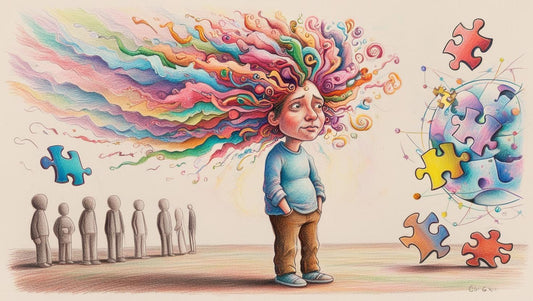
The Power of Unmasking: Embracing Your Neurodivergent Identity
Share
Have you ever felt like you were playing a role just to fit in?
Like you had to carefully measure every word, every reaction, every movement—just to avoid standing out? Maybe you’ve rehearsed conversations in your head before speaking or forced yourself to make eye contact even when it felt unnatural. Maybe you’ve toned yourself down, held yourself back, or changed the way you talk, move, or express excitement—just so others wouldn’t call you “too much.”
If that sounds familiar, you’ve been masking. And you’re not alone.
What is masking?
Masking is what many neurodivergent people do to appear more “normal” in a world that wasn’t built for us. It’s the learned behaviors, coping strategies, and constant self-monitoring that help us blend in, often at the cost of our mental and emotional well-being.
For some, masking starts in childhood—when we’re told to sit still, stop talking so much, stop daydreaming, stop interrupting, stop being “difficult.” Over time, we learn to suppress the things that make us different. We laugh when others laugh, even if we don’t get the joke. We push through overstimulation and exhaustion just to keep up. We pretend to be fine, even when we’re drowning.
And after years of doing this, many of us don’t even know where the mask ends and we begin.
But what happens when the mask comes off?
Have you ever felt completely drained after socializing? Like you’ve been acting all day and just need to be alone to “reset”? That’s the cost of masking. It’s exhausting. It disconnects us from who we truly are.
But here’s the thing: you don’t have to live like that forever. Unmasking—allowing yourself to exist as you are, without filtering or shrinking—is one of the most powerful things you can do.
It’s giving yourself permission to stim when you need to, info-dump about what you love, take breaks when you’re overwhelmed, and express emotions in the way that feels natural to you. It’s allowing yourself to exist without apology.
Okay, but what if people don’t accept the real me?
That’s the fear, right? That if we stop masking, people won’t understand. That they’ll judge us, reject us, or find us difficult to be around. And unfortunately, sometimes that happens. But the people who truly love and respect you will want to know the real you—not the version of you that’s performing for their comfort.
And the more you embrace yourself, the more you’ll find the spaces and people that embrace you too.
Unapologetically You
Unmasking doesn’t happen overnight. It’s a process of learning to recognize when you’re masking and giving yourself permission to exist without constantly filtering yourself. If you’re wondering where to start, here are a few ways to step into your unapologetic self:
- Pay attention to when you’re masking. Notice when you’re suppressing a natural behavior or forcing yourself to act a certain way to fit in. Ask yourself—do I really want to do this, or am I doing it to make others comfortable?
- Let yourself stim, fidget, or move in ways that feel natural. If rocking, tapping, or pacing helps you regulate, allow yourself to do it without shame.
- Honor your social and sensory limits. If you need alone time to recharge, take it. If loud environments overwhelm you, don’t force yourself to endure them.
- Speak in a way that feels right for you. Whether that means using direct communication, scripting conversations, or embracing your natural speech patterns—your voice matters as it is.
- Find or create spaces where you feel safe being yourself. Surround yourself with people who respect and celebrate your neurodivergence instead of making you feel like you need to change.
Most importantly, remind yourself that you are enough—not despite your differences, but because of them.
You don’t have to fit into their world. You were made to create your own.



